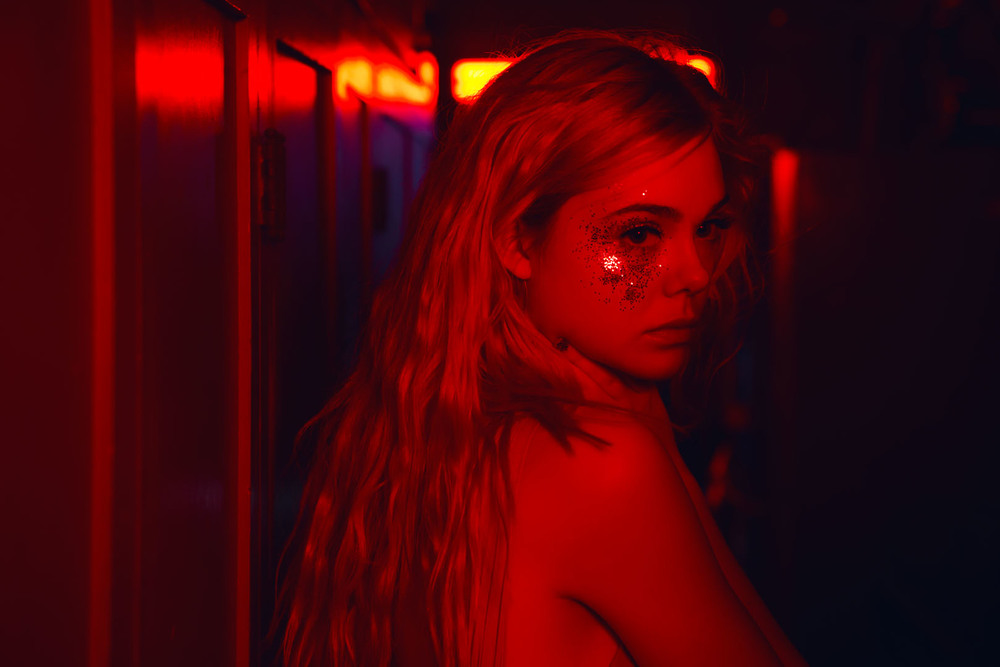
Nicolas Winding Refn is a famously divisive filmmaker who often provokes very heated discussions about his work. So, in keeping with the tradition, we thought it would only be right for us here at Dim the House Lights to host our own little debate about Refn’s latest opus, The Neon Demon. Beware, here be spoilers! Additionally, you can read Ross’ individual review for the film here and Juan’s here.
[CW: rape, cannibalism, necrophilia]
—
Ross: Juan, we both loved The Neon Demon, but we still seem to have a few differing views about certain aspects of it. The polarizing responses to Refn’s work, even within groups of people who seem to agree on the films overall, are part of what fascinates me so much about him. He’s an incredibly individual filmmaker and is only becoming more so as time goes on. While I don’t think The Neon Demon is his best film to date, it’s certainly his most visually ambitious, technically accomplished and fully-realized. Nevertheless, the film was booed at Cannes following its premiere earlier this year yet it still managed to earn itself a fair share of loyal defenders. Did you find yourself booing internally at anything? Why do you think Refn is so divisive?
Juan: The Neon Demon getting booed at Cannes is the least surprising thing I’ve ever heard. Outside of the fact that Cannes audiences (and critics as well) are getting annoyingly vocal, I think Nicolas Winding Refn’s aesthetic begs controversy. He’s a willfully obtuse filmmaker and some people vibe with that and others don’t, and it’s one of those things where I don’t blame people for hating it because I understand why they hate it. While nothing is particularly explicit outside of some minor flashes of nudity, the necrophilic bit, and the knife nightmare, The Neon Demon seems crafted to provoke anyone who doesn’t immediately settle into Refn’s wavelength. He’s a provocateur by design and where Drive had all his indulgences filtered through an accessible narrative like James Sallis’ novel, Only God Forgives and The Neon Demon are designed to keep everyone at arm’s length. And its sense of humor (which you desperately need to think is funny to think this movie is any good) is another factor that I think is pushing people away. My first screening audience, much like Cannes, was annoyed beyond belief. One person I have mutual friends with commented angrily about it, saying, “It was just awful. Pure awful,” and “People wanted to leave.” My second one though, which was about ten people (half of which were film critics or people who work with film), seemed to fall into it more comfortably.
Ross: I think the pacing, much like Only God Forgives, is a problem for a lot of people. There are countless scenes where people just seem to stand in silence looking at each other. Refn clearly prefers to let his actors emote with zero dialogue if possible, a trait he shares with Terrence Malick, who has also become something of a divisive auteur of late. Silence seems to be one of the riskiest tools a filmmaker can utilize, especially at great lengths. I remember certain screenings of No Country for Old Men (which famously abandons a musical score all together) where audiences would get fidgety and uncomfortable with all the quietude, mistaking it for a lack of content rather than an intentional design choice. As you said, it all depends on if the audience is willing to get on board with it or not.
I think you’re onto something when you mentioned Drive. It remains Refn’s best film and his most accessible. It’s a perfect combination of genre and art-house. The silences and expressionistic flourishes there are offset by its action-movie foundations. It’s an experimental film, but still works as a B-movie about a getaway driver. The Neon Demon, on the other and, doesn’t have that accessibility hardwired into it. Sure, it has a horror element, an ensemble of attractive leading ladies and, like Drive, a pounding electronic score, but I wouldn’t be surprised if mainstream audiences find the film too obtuse and off-putting. I feel like a lot of people are still coming to Refn’s work as fans of Drive and are finding themselves repeatedly disappointed when they don’t get that film. I think commercially Refn would have more success if he were to do more straight-forward genre fare (like that Logan’s Run remake he keeps teasing us about) but I admire and appreciate that he is using his clout to make more idiosyncratic and left-field movies.
Personally, I’m happy to see him make movies like this for the rest of his life but I wonder how long he can get away with it for. Did you notice the NWR logo throughout the opening credits? That same logo is also on all his curated soundtrack releases for Milan Records. I think one of the things he’s trying to do is establish himself as an actual brand. He has become incredibly prolific of late in producing a slew of American remakes of cult classic horror movies (Maniac Cop, Witchfinder General and What Have You Done to Solange? are all currently in production) so I wouldn’t be surprised if “Nicolas Winding Refn presents” becomes the new “Quentin Tarantino presents.” Do you think Refn is happy to carve out his own little corner in the sandbox and rely on a trusted fanbase, or is he hungry for box office domination?
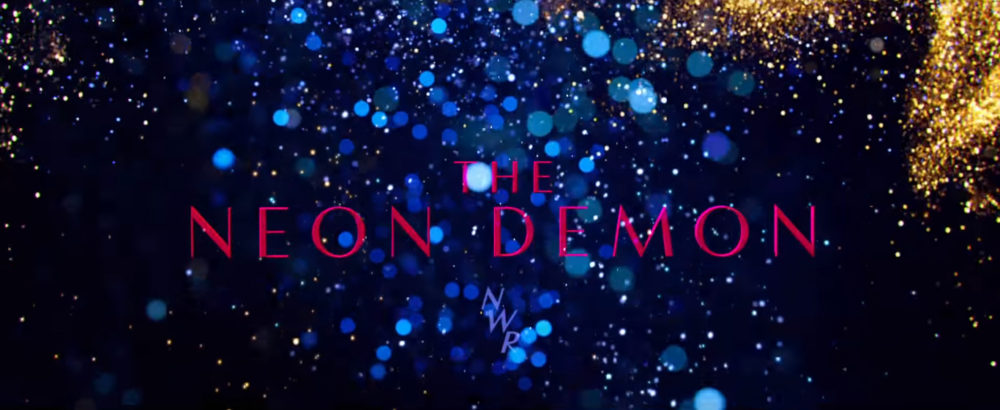
Juan: I was so riveted by the NWR logo and how prominent it felt in those opening credits (which were so gorgeous in their own right, as we the closing credits, where his dedication to his wife is an especially hilarious touch). The concept of “Refn presents” as the new “Tarantino presents” or even “Guillermo del Toro presents” is interesting and I hope you’re right, though I also hope that his productions end up actually contributing to good genre works, unlike the latter example (because GDT hasn’t produced too many great ones outside of El Orfanato). I think, though, that Refn is only interesting in making the projects he wants to make, and he’s well aware that some folks will love them even though most hate them. You don’t get booed twice in a row at Cannes without knowing exactly what you’re doing. The problem I see with box office results is that Broadgreen, the distributor for this alongside Amazon Studios, is focusing on a relatively wide release instead of smaller arthouse cinemas. This is a movie that begs for an audience who understands what he’s going for, or at least is going to have someone to give them some warning prior to engaging with it. It’s why I keep telling everyone, “It’s gorgeous to look at and I personally adored it and think it’s great, but most people are going to loathe this movie.”
Ross: Refn clearly tried to make a film from a feminine standpoint. He has said repeatedly he wanted to “get in touch with the 16 year old girl inside him” (…okayyyyy). I’m hesitant to call this a feminist film. I would say it’s definitely a celebration of women, but from a very clear male perspective. The women are fetishized and beautiful–never a hair out of place. They look like porcelain dolls. Of course this works to the film’s aesthetic advantage and is appropriate to the backdrop. But while Refn clearly worships women, I wouldn’t say he breaks any ground in depicting them onscreen. What do you think?
Juan: The problem with a statement like “get in touch with the 16 year old girl inside him” is that, while all men should probably embrace the longing to access their femininity and showcase women and hire women on productions, most men are too engulfed in male fantasies and what men think female nightmares are like to actually make movies where that femininity doesn’t feel betrayed. I was discussing it with a filmmaker friend of mine and she put it bluntly: “Lots of oral fixation shit. The knife scene was like every other grudge fuck porn ever—just replace the actual body part with a knife.” And it’s true. That’s the kind of scene that really puts me off from calling this even remotely feminist because it’s grossly unnecessary. It’s not the fact that every actress is positioned like a mannequin and stylized like they’re in an actual fashion shoot even when they’re not in one that bothers me because that’s just good blocking and good direction of performers to achieve the desired goal.
As much as Refn tries to bring in a feminine perspective (and having two women writing helps, but not enough), he’s prone to making broad strokes about what he thinks are “female things” and punctuates those thoughts with dialogue that’s as cold and hard as the mannequins he models his actresses after. Again, that fits his dreamscape, but it’s certainly not something I’d call feminist or say has any genuine insight into the lives of women. But, in his defense, outside of the knife scene, I don’t think the movie feels exploitative in the way it presents their bodies. Then again, we’re two men discussing a movie made primarily by a man, so deciding whether or not it’s problematic is inherently also problematic.
In great part I think I feel this way because of the fact that Natasha Braier is a great cinematographer who brings out eroticism and discomfort beautifully and really knows how to sync with the filmmakers she works with. It also helps that Erin Benach’s costuming decisions often keep the girls clothed where they might otherwise be even more exposed. If not for Braier, I think two of my favorite sequences involving Ruby’s (Jena Malone) perspective and fantasies—her masturbating with a corpse while fantasizing about Jesse (Elle Fanning) and her bathing in blood while watching Gigi (Bella Heathcote) and Sarah (Abbey Lee) wash blood off each other—would have unfolded in a painfully exploitative manner, focusing on their nudity, but instead it feels weirdly grounded in Ruby’s mind. It’s less explicitly sexual and more grounded in the feeling of melancholy and longing that comes with the beauty of doing something horrific and realizing that sometimes what you thought you wanted isn’t what you get.
Ross: See, now this is where I think we slightly disagree. Despite Braier and Benach’s contributions, this still feels like a story looked at through the prism of the male gaze. Refn avoids giving these women much personality and outside of their looks and their cruelty we really don’t know much about them. Even the idea of making one of them a lesbian feels like a bit of an excuse for the camera to lust after them visually. The shot of the two girls in the shower, to me, is one hundred percent gratuitous despite being stylistically stunning. I’m not saying this is a problem. I think Refn is coming from a respectable place, but he does fail in making a feminine movie because it still felt very masculine in its viewpoint and concerns.
I saw the film at a Q&A with Refn present and he seemed to get frustrated that very few women in the audience were asking questions. After a bit of encouragement on his part, one lady explained that she felt the film wasn’t necessarily representative of a female audience. It’s just another movie where a lot of perfect looking women (many of them literal supermodels) show off their bodies to be leered over or slaughtered. Upon seeing the trailer my girlfriend groaned and said “So another boy’s movie?” Now, given the film’s subject matter, you couldn’t really cast actresses who aren’t good looking and I don’t want to suggest that that’s all they are about–they’re not–but I feel like if Refn wanted to make an all-female horror movie that also worked for a female audience, he could have taken the time to tap into their psychology a bit more or maybe chosen a different backdrop all together. Obviously you could argue that the women here aren’t any less developed than Julian was in Only God Forgives–Refn does enjoy a good blank canvas for a protagonist–but I can’t help but think of a film like Black Swan which covers a lot of the same ground and is also directed by a man but still feels inclusive to women whereas this film doesn’t.
Does any of this matter? Am I right in thinking the film would enjoy more success if women were fighting its corner rather than feeling indifference?
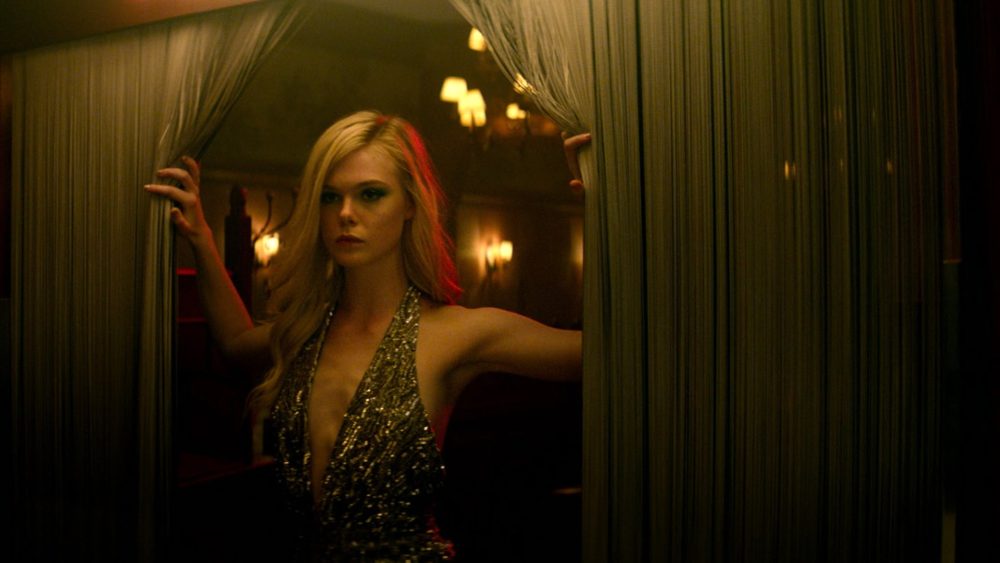
Juan: Oh, no, you’re right. It’s definitely coming from a masculine place because, well, he’s a dude who is drawing from a genre well-known for being very masculine in the way it presents female tales. And if we slide into focusing on it as giallo and not strictly just horror, even more so. There are filmmakers tapping into that who actually focus on the woman at the forefront, like Hélène Cattet and Bruno Forzani’s Amer, but I almost wonder if Refn’s aesthetic would be diluted if he actually gave his characters more personality and background than the little he does. I don’t want to say he doesn’t care about them past face-value, though that seems the case with Jesse and Only God Forgives’ Julian. Do I think fleshing out its female characters would make it a better movie? That’s debatable. I think part of the charm is the fact that Jesse is the epitome of the “good girl” even when she’s playing up her Mulholland Dr.-esque personality shift while Gigi and Sarah play up the cattiness that comes with popular ideas of models (and Ruby falls somewhere into the weird predatory psychotic queer trope that I should hate but love way too much in this film).
Of the few women I know who have seen the film, one hated it and two loved it. The one who hated it had this as her first experience with Refn’s films and the others had varying levels of experience with him. As for reviews by women, one in particular stood out to me in bringing up a scene that I haven’t heard many talk about: April Wolfe’s for LA Weekly. A lot of it discusses its relation to giallo in depth and then the last paragraph criticizes The Neon Demon for the incredibly giallo-based sequence in which Jesse hears a rape happen in the motel room next to her own:
“Rape is not a fucking plot point. It’s just not. People attempt to rape Jesse twice within the span of 10 minutes, and while we don’t see a rape happen, we see one attempt and hear the excruciating screams of a 13-year-old girl getting raped in the room next to Jesse’s. Much of this film works because it’s a fantastical vision of a bleak world, but the moment with the 13 year old departs in tone: It is too real. And it’s difficult to move on emotionally to each successive scene. The rape doesn’t build tension. It deflates. It’s lazy writing and filmmaking, so even if it achieves Refn’s goal of shocking us, it’s unoriginal and used by far too many male filmmakers as a cheap thrill.”
Now, for some reason, I found this scene less bothersome than the one where Elle Fanning quite literally has a knife slid into her mouth and is told to take it deeper and to open her mouth wider. That’s where things felt more exploitative, even though it stills exists within this strange realm between fantasy and reality (just as the audible rape does). I think it might have bothered me less because of the fact that it all felt like it was still within this heightened, dreamlike reality that wasn’t actually real and more like it was taking place within the fears/imagination/nightmares of this young virgin girl in a world where sex just kind of seems dangerous in every way. That said, I don’t blame anyone for thinking any particular scene in this movie is problematic because everyone reacts to things differently.
These are some of the extreme moments in the film, so I’m curious to know what you think about these scenes and whether or not they bothered you. Is Refn being a provocateur à la Gaspar Noé or is he trying to be playful, and how do those two states of mind intersect? It feels like he’s leaning toward being a provocateur and certain scenes that feel like “too much” in a film I otherwise love make it all the harder for me to openly admit that I had a fun time watching it and am looking forward to a second viewing.
Ross: That sequence with the young girl is one that really stood out to me because of how it got under my skin. I spoke about it in my original review briefly. I agree that it’s more symbolic than literal. It’s no coincidence that incident is what finally sends Jesse running to Ruby for solace which, ultimately, leads to her downfall. It’s almost like we’re hearing a little bit of Jesse’s innocence being devoured in that next room but, clearly, it’s completely open to interpretation and will no doubt gain a variety of mixed responses.
As for Refn being a provocateur, I think that’s precisely what he is. He’s one of those filmmakers who loves to stir the pot and anger people as much as he pleases them. It’s all done in good spirits though. The violence and trash in his movies always feels like a catharsis for me. The moment Ryan Gosling stomps that guy’s head in the elevator in Drive is like the orgasm of that film (a comparison I’m sure Refn would approve of). Similarly here, when we get to that already-infamous necrophilia scene, I literally sat forward in my chair, excited that the film was finally going to get its hands dirty and go somewhere depraved and forbidden. I’m a fan of Refn though and this is what I expect from him. My whole obsession with movies can be traced back to watching shitty VHS copies of banned video nasties. I like visceral, sensationalist cinema so I’m obviously going to respond to a filmmaker like Refn and a film like The Neon Demon. As a filmmaker, Refn seems to be coming from the same place. Most of his favorite movies (The Texas Chain Saw Massacre, Cannibal Holocaust) are hardcore genre films so it’s no surprise that he wants to make movies which elicit an extreme or divisive response. The funniest thing about all this is that he packages them in these increasingly lush and pristine perfume boxes. Has a film about cannibal models ever looked so goddamn beautiful? It all comes down to taste. The film isn’t perfect. But it is visionary… and quite delicious.
—
Directed by Nicolas Winding Refn; written by Nicolas Winding Refn, Polly Stenham, Mary Laws; starring Elle Fanning, Jena Malone, Bella Heathcote, Abbey Lee, Keanu Reeves, Desmond Harrington, Alessandro Nivola, Karl Glusman, and Christina Hendricks; 117 minutes.

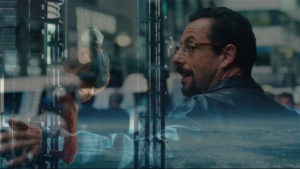
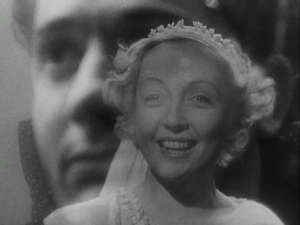
 Derek
Derek
 Isabelle
Isabelle